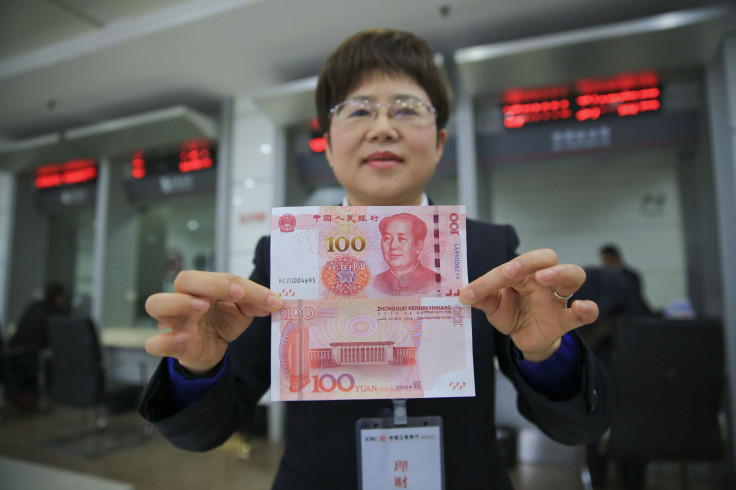China's Renminbi Is Joining The IMF's Elite Currency Club

The International Monetary Fund today added China's renminbi into the elite club of currencies that make up the organization’s basic unit of exchange. While being a component of the IMF's Special Drawing Rights move is a political plum for Beijing, it is unlikely to drive the internationalization of Chinese financial markets, which will turn on China's willingness to allow foreigners to invest in its largely insulated bond market.
The IMF’s top governing body approved the inclusion of the Chinese currency into the unit of exchange, which the IMF uses to track its own reserves and holdings of its members, and is sometimes used by members for their own transactions. Over the past year, Beijing had pushed strongly for the change, which nominally puts it in the same category as the U.S. dollar, the British pound, the Japanese yen and the euro.
The change at the IMF will take effect in about a year. The renminbi is China's currency; its unit of exchange is the yuan, which is also how many people refer to the currency itself.
“The near-term effects will be the increased prestige and standing of the Chinese economy and the recognition that China has become more closely integrated into the global economy,” Bill Witherell, chief global economist at Cumberland Advisors, said.
Greater use of the yuan by stewards of central bank reserves and global asset managers won't come automatically as a result of the IMF's decision. That development, which would be a sea change in international currency markets long dominated by the U.S. dollar, depends far more on China’s willingness to continue the slow -- some might say excruciatingly slow -- process of opening its capital markets to foreign investors.
Investors mostly swap currencies so they can purchase assets issued in a currency other than their own, rather than for pure speculation. China is notable for having a huge domestic capital market that's largely off-limits for foreigners, a policy that reflects Beijing’s reluctance to cede power to uncontrollable economic forces -- and one that limits appetites for its currency.
The internationalization of China’s bond market, for example, is not even 13 years old. In 2002, China began licensing some foreign firms to participate in the market, which is dominated by domestic banks. Other piecemeal measures followed over the years. In July, China ended a requirement that foreign sovereign-asset buyers, such as central banks, obtain government approval to purchase bonds in markets on the mainland.
Foreigners have had access to the much smaller “dim-sum” market of offshore renminbi-denominated bonds for some time. But the international use of China's currency will turn on access to its domestic bond market, worth about 35.9 trillion renminbi -- about $5.6 trillion -- at the end of 2014, according to Goldman Sachs.
“Investors seeking access to China’s strong growth via the bond market continue to face hurdles, including a lack of familiarity with the range of bonds available, restrictions on who can invest and how, and other aspects of the Chinese bond market,” Goldman wrote in a recent research report.
While the decision follows a review by the IMF staff, the inclusion of the yuan in its official basket of currencies has a whiff of politics to it.
In 2009, the head of the People’s Bank of China, Zhou Xiaochuan, called for the IMF unit to become a “supersovereign reserve currency.” While visiting Washington last month, President Xi Jinping publicly thanked the United States for supporting Beijing’s bid for including the yuan.
IMF rules dictate that a currency be “freely usable,” a debatable proposition in the case of China, which still imposes capital controls and has faced widespread accusations of manipulating its currency to boost exports. Trading in China's currency is emerging in fits and starts, with a hub for it operating in Hong Kong and other efforts in London gaining traction. The IMF staff acknowledged the limited global use of the Chinese currency but emphasized that the organization’s governing board has wide latitude to make such decisions.
China’s devaluation of its currency in August was widely viewed as a demonstration that Beijing is ready for a more flexible exchange rate structure.
Edwin Truman, a senior fellow at the Peterson Institute for International Economics, said the IMF’s managing director, former French Finance Minister Christine Lagarde, has bowed to Chinese demands despite the economic facts. Although data on reserve currencies are spotty when it comes to China, the nation's currency is a negligible part of the mix, valued at $11.5 trillion in mid-2015, according to the IMF’s own figures.
“Lagarde appears to have decided to give the Chinese authorities the political trophy of inclusion of their currency in the SDR basket and to take personal credit for this action,” Truman wrote in a blog post.
Carl Weinberg, chief economist with High Frequency Economics, pointed out that government restrictions on a currency’s usage have never been an absolute bar to being included in the IMF’s basket. Japan’s yen and the now-defunct French franc were both covered by capital controls at times, he noted.
© Copyright IBTimes 2024. All rights reserved.











